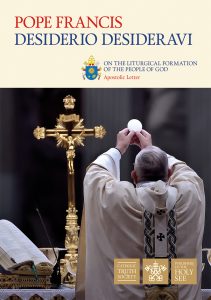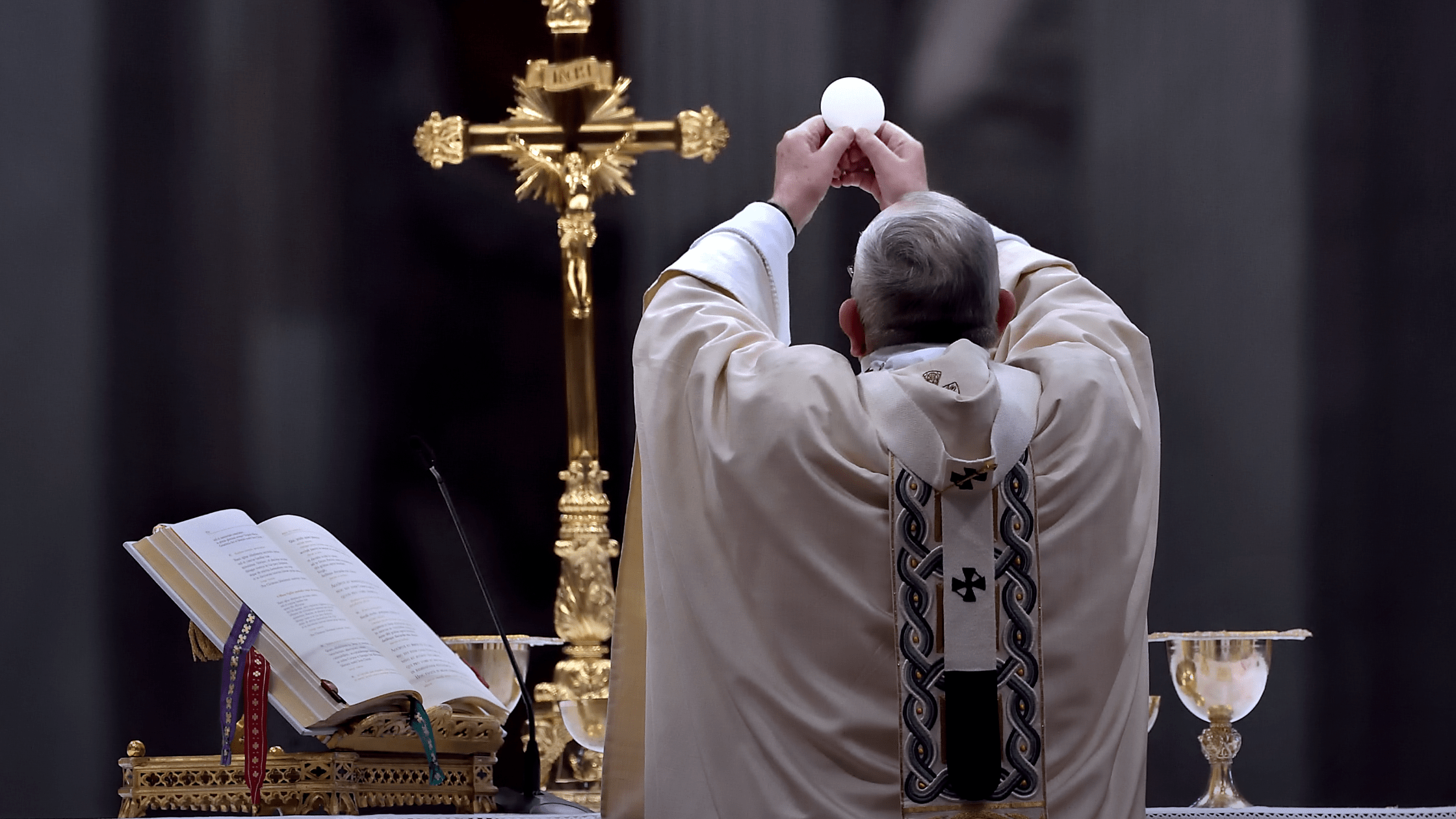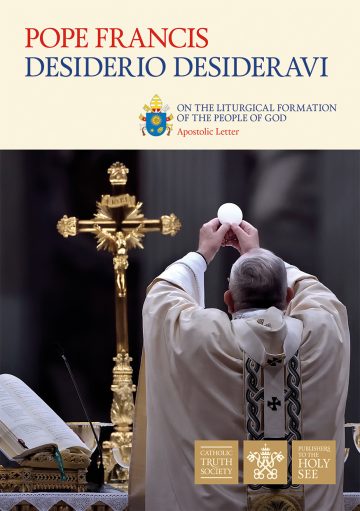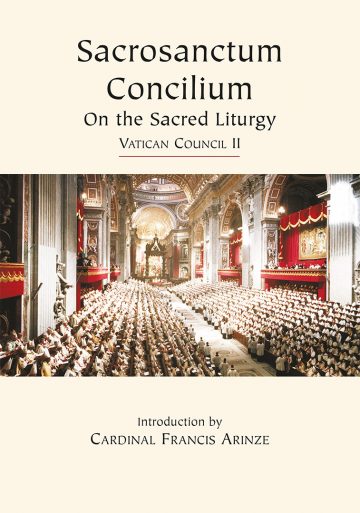- Bring others to the supper of the Lamb:
“The world still does not know it, but everyone is invited to the supper of the wedding of the Lamb (Re 19:9). To be admitted to the feast all that is required is the wedding garment of faith which comes from the hearing of his Word (cf. Ro 10:17). The Church tailors such a garment to fit each one with the whiteness of a garment bathed in the blood of the Lamb. (Re 7:14). We must not allow ourselves even a moment of rest, knowing that still not everyone has received an invitation to this Supper or knowing that others have forgotten it or have got lost along the way in the twists and turns of human living.” (§5) - Rediscover, safeguard and live the truth of the liturgy:
“With this letter I simply want to invite the whole Church to rediscover, to safeguard, and to live the truth and power of the Christian celebration. I want the beauty of the Christian celebration and its necessary consequences for the life of the Church not to be spoiled by a superficial and foreshortened understanding of its value or, worse yet, by its being exploited in service of some ideological vision, no matter what the hue.” (§16) - Observe the rubrics:
“Let us be clear here: every aspect of the celebration must be carefully tended to (space, time, gestures, words, objects, vestments, song, music…) and every rubric must be observed. Such attention would be enough to prevent robbing from the assembly what is owed to it; namely, the paschal mystery celebrated according to the ritual that the Church sets down.” (§23) - Accepting Sacrosanctum Concilium:
“It would be trivial to read the tensions, unfortunately present around the celebration, as a simple divergence between different tastes concerning a particular ritual form. The problematic is primarily ecclesiological. I do not see how it is possible to say that one recognizes the validity of the Council — though it amazes me that a Catholic might presume not to do so — and at the same time not accept the liturgical reform born out of Sacrosanctum Concilium, a document that expresses the reality of the Liturgy intimately joined to the vision of Church so admirably described in Lumen gentium.” (§31) - Evangelisation and encountering the Lord:
“A celebration that does not evangelize is not authentic, just as a proclamation that does not lead to an encounter with the risen Lord in the celebration is not authentic. And then both of these, without the testimony of charity, are like sounding a noisy gong or a clanging cymbal. (1 Cor 13:1)” (§37) - Learning to read symbols:
“[Romano] Guardini writes, “Here there is outlined the first task of the work of liturgical formation: man must become once again capable of symbols.” This is a responsibility for all, for ordained ministers and the faithful alike. The task is not easy because modern man has become illiterate, no longer able to read symbols; it is almost as if their existence is not even suspected.” (§44) - One body:
“Everybody doing together the same gesture, everyone speaking together in one voice — this transmits to each individual the energy of the entire assembly. It is a uniformity that not only does not deaden but, on the contrary, educates individual believers to discover the authentic uniqueness of their personalities not in individualistic attitudes but in the awareness of being one body. It is not a question of following a book of liturgical etiquette. … These are gestures and words that place order within our interior world making us live certain feelings, attitudes, behaviours.” (§51) - How the priest presides at Mass:
“In visiting Christian communities, I have noticed that their way of living the liturgical celebration is conditioned — for better or, unfortunately, for worse — by the way in which their pastor presides in the assembly. We could say that there are different “models” of presiding. Here is a possible list of approaches, which even though opposed to each other, characterize a way of presiding that is certainly inadequate: rigid austerity or an exasperating creativity, a spiritualizing mysticism or a practical functionalism, a rushed briskness or an overemphasized slowness, a sloppy carelessness or an excessive finickiness, a superabundant friendliness or priestly impassibility. Granted the wide range of these examples, I think that the inadequacy of these models of presiding have a common root: a heightened personalism of the celebrating style which at times expresses a poorly concealed mania to be the centre of attention.” (§54) - The priest and Jesus’ burning heart of love:
The priest himself should be overpowered by this desire for communion that the Lord has toward each person. It is as if he were placed in the middle between Jesus’ burning heart of love and the heart of each of the faithful, which is the object of the Lord’s love. To preside at Eucharist is to be plunged into the furnace of God’s love. (§57) - Abandon polemics: Let us abandon our polemics to listen together to what the Spirit is saying to the Church. Let us safeguard our communion. Let us continue to be astonished at the beauty of the Liturgy. The Paschal Mystery has been given to us. Let us allow ourselves to be embraced by the desire that the Lord continues to have to eat His Passover with us. All this under the gaze of Mary, Mother of the Church. (§65)
 These quotes are extracted from Desiderio Desideravi. Pope Francis shares some reflections on the liturgy for all Catholics, focusing on the tensions present around the celebration of the liturgy and emphasising the need for “serious and dynamic liturgical formation”, while calling on Catholics to accept the liturgical reform borne out of Sacrosanctum Concilium.
These quotes are extracted from Desiderio Desideravi. Pope Francis shares some reflections on the liturgy for all Catholics, focusing on the tensions present around the celebration of the liturgy and emphasising the need for “serious and dynamic liturgical formation”, while calling on Catholics to accept the liturgical reform borne out of Sacrosanctum Concilium.
Read more of Pope Francis’ reflections and support the mission of CTS by ordering your copy of Desiderio Desideravi.



